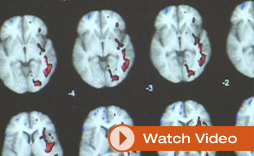
In MINDS ON THE EDGE, the Nobel-Prize-winning neurologist Dr. Eric Kandel, points out that the term "mental" illness can distort public understanding of the nature of these disorders.

Learn more about Schizophrenia.

Learn more about bipolar disorder.

Cutting-edge research is expanding the knowledge base of mental illness. View this excerpt from NARSAD's TO FIND A CURE.

Can functional magnetic resonance imaging detect bipolar disorder?
Dr. Jim Lagopoulos, a research scientist at the University of Sydney, Australia, is using brain imaging to see if he can discover a key to detecting bipolar disorder at its earliest stages.
Adults with bipolar disorder often recall that their symptoms began before age 16, but early diagnosis can be difficult because symptoms tend to show themselves differently in children and adolescents. Dr. Lagopoulos is using a kind of brain imaging called functional MRI (fMRI) to study the exact kinds of neurobiological changes associated with emotional processing and social understanding in children diagnosed with bipolar disorder type 1. This is an opportunity to study the core brain changes in bipolar disorder around the time the illness begins, before a long history of bipolar disorder may cause further changes.
These studies may help clarify how bipolar disorder develops and may identify biological signs of the beginning and progression of the disease - which can ultimately lead to strategies for prevention, treatment, and avoiding relapse.
For more information on cutting-edge research, visit www.narsad.org

Might genes inhibit critical neural development?
Dr. Andreas Keller of Rockefeller University in New York believes that understanding how people process information about common odors can lead to a fuller understanding of schizophrenia.
People with schizophrenia are unable to identify some familiar odors. This is significant because information about smells is processed in the same brain areas that control emotions and social behavior, which are severely affected in people with schizophrenia. Problems identifying odors may be caused by the same brain abnormalities that cause the most incapacitating symptoms of the illness. To identify an odor, a person must be able to detect the odor, distinguish it from other odors, remember the smell, and identify the smell with words, as in a wine tasting. Dr. Keller is testing how each of these stages works in 100 patients with schizophrenia and 100 people without the disease, using four very different odors in the test.
This work will help define the brain regions and thought processes affected in schizophrenia and may ultimately help psychiatrists diagnose people based on how they process the sense of smell.
For more information on cutting-edge research, visit www.narsad.org

Is bipolar disorder correlated to brain inflammation?
Dr. Marlon P. Quinones, of University of North Carolina-Chapel Hill, is studying the brain to see if inflammation may play a critical role in the development of bipolar disorder.
Bipolar disorder is thought to occur when genetic and environmental factors interact to disrupt brain circuits that regulate mood and behavior. Sophisticated brain research using a technology called proton magnetic resonance spectroscopy, cognitive testing, and measurements of the density of gray matter all suggest that inflammation is an important factor in the illness. However, scientists do not yet understand the nature of that connection.
Dr. Quinones' research will determine whether the degree of inflammation is correlated with structural or functional brain changes. This work could lead to ways to measure inflammation both to understand bipolar disorder and to predict how different individuals with the disease will respond to treatment.
For more information on cutting-edge research, visit www.narsad.org

Might genes inhibit critical neural development?
Dr. Jasmine Chen, of the University of California, San Francisco, is studying what goes wrong in the brain to cause a major symptom of schizophrenia: the disruption of high-level cognitive functioning, the thinking processes necessary for effectiveness in life.
Cognitive processes are governed by the cortex of the brain, and depend on the balance between neurons and other brain cells that use the neurotransmitters glutamate and GABA. Dr. Chen is focusing on genetic factors that may interfere with the development of brain cells in this system - and may hold significant clues to the origins of schizophrenia.
For more information on cutting-edge research, visit www.narsad.org
CONTENT ACKNOWLEDGEMENT
Thanks to NARSAD for this web content on the Science of Mental Illness. The world’s leading charity dedicated to mental health research, NARSAD invests in research that holds the keys to the prevention and treatment of mental illness such as schizophrenia, bipolar disorder and depression. Learn more at www.narsad.org


